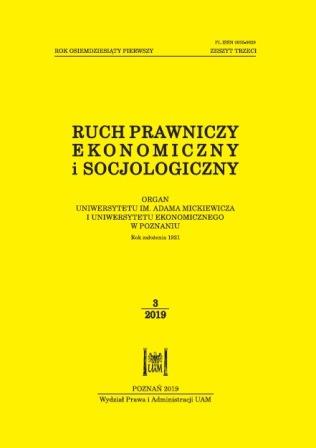Obowiązek stosowania przez przedsiębiorców wewnętrznych procedur antykorupcyjnych w świetle projektu ustawy o jawności życia publicznego
The obligation for entrepreneurs to apply anti-corruption procedures in the light of the draft act on the transparency of public life
Author(s): Magdalena Kowalewska-Łukuć, Lucyna StaniszewskaSubject(s): Criminal Law, Labor relations, Penal Policy, Corruption - Transparency - Anti-Corruption
Published by: Uniwersytet im. Adama Mickiewicza w Poznaniu
Keywords: liability of collective entities; administrative fines; anti-corruption procedure;
Summary/Abstract: The article focuses on the issue of punishment in the draft bill of the Act on the Transparency of Public Life. The adoption of the concept of administrative sanctions for violation of the law is a matter of concern. Corruption, due to the fact it is culpable and blameworthy, has been penalized by criminal law for years. The new sanctioning procedure is related to the need to penalize collective entities more effectively and efficiently. However, there are undoubtedly already regulations in criminal law that allow such entities to be held accountable. The new amendment will create an additional regime of quasi-criminal liability, which will clearly not guarantee effective and quick punishment. Aside from the amount of the sanctions, which can reach a maximum of PLN10 million, the procedure for imposing penalties is also questionable. Firstly, the Head of the Central Anti-corruption Bureau (CBA) will impose a fine on the enterprise. If the entrepreneur does not pay this fine voluntarily, an application to hold the enterprise liable will be forwarded to the President of the Office of Competition and Consumer Protection (UOKiK). However, under new regulations the position of the President is reduced to the role of an enforcer. Furthermore, anti-corruption procedures clearly fall under the competence of the Head of CBA, not of the President of UOKiK, hence the structure adopted in the Act is incomprehensible. The conclusion of the article is that it is necessary for the authors of the Act to reflect on the model of punishment for violating anti-corruption procedures.
Journal: Ruch Prawniczy, Ekonomiczny i Socjologiczny
- Issue Year: 81/2019
- Issue No: 3
- Page Range: 87-99
- Page Count: 13
- Language: Polish

